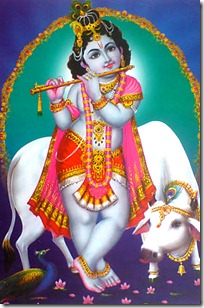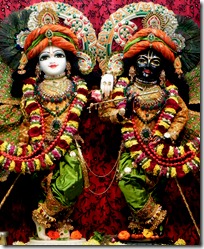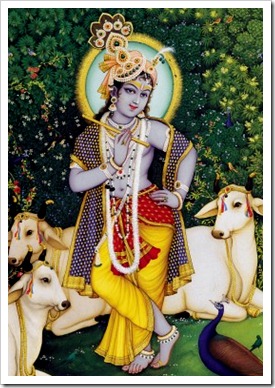 “Since Krishna is the source of our generation, or the supreme father, no one can be a better friend than Krishna, nor can anyone be a better well-wisher.” (Shrila Prabhupada, Bhagavad-gita, 9.18 Purport)
“Since Krishna is the source of our generation, or the supreme father, no one can be a better friend than Krishna, nor can anyone be a better well-wisher.” (Shrila Prabhupada, Bhagavad-gita, 9.18 Purport)With some friends, it doesn’t matter how much time you spend away from them, the ease of interaction and compatibility in thoughts and interests will always remain. Despite the number of years spent separated, during which time new interests and desires are sure to be introduced, upon meeting again, all the old stories and common points of interest return. Interestingly enough, we have had a strong connection with one entity in particular since the beginning of time. No matter how much time passes or how much we try to forget His presence, His open offer of friendship and kindness never expires. Should we have the good fortune of understanding this notable personality and His ever-merciful nature, the loneliness brought on by material contact can forever fade away.
Every living entity assumes different qualities at the time of birth. This is readily perceptible to even the least spiritually conscious individual, as we see that certain children take to quiet behavior in their youth while others are overly active and driven to naughty behavior. The visible signs of a person’s inherent nature first appear in the early years, for it is not uncommon to learn that the great success stories in the entertainment, sports and business worlds polished their abilities while they were young. A star golfer likely first picked up a club before they were able to talk, a businessman honed in his skills at trading and earning a profit while still in school, and an actor was drawn to giving performances in the home in front of family and guests.
“Whatever state of being one remembers when he quits his body, that state he will attain without fail.” (Lord Krishna, Bhagavad-gita, 8.6)
 The Vedas, the ancient scriptures of India, kindly provide some background information in this regard. Based on the past desires of the essence of individuality, the individual spirit soul, a specific body type was crafted. For instance, if we wanted to be a star athlete in a previous life and took the necessary steps to direct our consciousness in that area, the next form of body was crafted perfectly to meet those desires. The reactions to our past work also played a role in our fortunes, as every action has a commensurate reaction, which can be favorable or unfavorable. This is how karma, or fruitive activity, operates.
The Vedas, the ancient scriptures of India, kindly provide some background information in this regard. Based on the past desires of the essence of individuality, the individual spirit soul, a specific body type was crafted. For instance, if we wanted to be a star athlete in a previous life and took the necessary steps to direct our consciousness in that area, the next form of body was crafted perfectly to meet those desires. The reactions to our past work also played a role in our fortunes, as every action has a commensurate reaction, which can be favorable or unfavorable. This is how karma, or fruitive activity, operates.The shaping of material bodies based on desire and work is generally considered an Eastern concept, but we actually see evidence of the workings of action and reaction in our daily endeavors. If an individual puts in the time to study and do well in school for the purpose of succeeding in a specific career path, they will likely get what they want later in life. Similarly, if someone should neglect an important action like stopping at a red traffic light or yielding to oncoming traffic, there will likely be a negative result in the form of a traffic accident. Where the Vedas are unique is that they don’t assume the reactions to work stop with death. Indeed, the spirit soul lives forever, as we know that life existed on earth prior to our birth. We also know from the passing of other entities that life will continue to exist should we leave our present body. Since the material nature continues to exist, it is safe to assume that the soul will exist perpetually as well.
The accumulation of reactions to work is not exclusive to the spirit souls dwelling in human bodies; the soul can be placed into any form. The animal species, those we view to be wholly ignorant, are spirit souls who have desires to enjoy their senses without any impediment. One who is addicted to sex life will have a much easier time fulfilling their desires in the body of a dog or a monkey than in a human form. The influence of adhyatmika miseries, those brought on by the mind and personal senses, is greatly reduced in the animal kingdom. A human being gets ulcers worrying about how to pay the rent, find a life partner and deal with issues at home and at the office, but the ignorant animal has no such concerns. They don’t even have to worry about wooing members of the opposite sex; they just have intimate relations with whoever is around.
The human being is advanced in its ability to acquire intelligence. The key is to make use of that potential, as imitating the eating, sleeping, mating and defending habits of the animal doesn’t represent any real advancement. A human being lacking God consciousness is really no different than an animal and can even be considered a less evolved species due to the increased miseries brought on by the mind, which is constantly hankering and lamenting. The pendulum consisting of the desire to enjoy and the need to renounce constantly swings back and forth, bringing about seeming changes in thoughts and circumstances, while not really taking the individual to any elevated level of consciousness.
Though the human species is considered the most advanced, based on the qualities assumed at the time of birth, there are still varying penchants for desire and interest. Friendships are formed based on common interest, as we will bond with people who like the same things that we do and who engage in the same types of activities that we enjoy. It’s interesting to note, however, that friendships cannot be forced. We can work with someone every day in the same office for years and try our best to form a connection with them in terms of interest and conversation, but if there is no compatibility in natures, a true friendship will never be formed. With some people it is very difficult to have conversations and develop a rapport that makes their association enjoyable.
With our good friends, however, no amount of time spent apart can break the connection. Indeed, the actual time it took to originally form the friendship could have been very short, maybe even a few weeks or months. To use an example, the friendships created during the short four years of college don’t necessarily bring about continued association after graduation. Individuals eventually part their separate ways and go on to settle down in cities that can be many miles apart. Yet upon reuniting with their college friends, the spark is still there in the conversations. Even when meeting after many years, it feels as if no time has passed at all, as the dialogue flows smoothly and evenly, with the interests still remaining the same.
“Physical nature is known to be endlessly mutable. The universe is the cosmic form of the Supreme Lord, and I am that Lord represented as the Supersoul, dwelling in the heart of every embodied being.” (Lord Krishna, Bg. 8.4)
 These strong connections are rare in occurrence and thus worthy of appreciation. Fortunately for every form of life, there is a connection to a singular entity that remains forever intact, regardless of the level of awareness of the relationship. Just as the spirit soul forms the basis of activity and individuality within every form of life, there is a more powerful soul, one that emanates from the Supreme Person, that accompanies the individual spiritual spark in its travels from one life form to the next. Depending on the time, circumstance, and spiritual tradition of the specific geographic location, this individual can be addressed by different names, but the Sanskrit word “Krishna” very nicely describes His all-attractive features. The person most of us know as God must be more attractive than anyone else; otherwise His features would be inferior. If the Supreme Being were deficient in any category of opulence, He couldn’t be deemed greater than anyone else; hence He would also lose His status as the person most deserving of worship.
These strong connections are rare in occurrence and thus worthy of appreciation. Fortunately for every form of life, there is a connection to a singular entity that remains forever intact, regardless of the level of awareness of the relationship. Just as the spirit soul forms the basis of activity and individuality within every form of life, there is a more powerful soul, one that emanates from the Supreme Person, that accompanies the individual spiritual spark in its travels from one life form to the next. Depending on the time, circumstance, and spiritual tradition of the specific geographic location, this individual can be addressed by different names, but the Sanskrit word “Krishna” very nicely describes His all-attractive features. The person most of us know as God must be more attractive than anyone else; otherwise His features would be inferior. If the Supreme Being were deficient in any category of opulence, He couldn’t be deemed greater than anyone else; hence He would also lose His status as the person most deserving of worship.As the predominant proclivity of the soul is to seek pleasure based on attractiveness, Krishna becomes the ideal beneficiary for our service. Depending on the person we interact with and our level of connection with them, offering service can be quite difficult. It’s much easier to serve someone with whom we have an identified relationship. And the more intimate the relationship, the stronger the affection and kindness will flow. Moreover, if there is to be service, there must be a tangible benefit derived, something which satisfies the emotional needs of the performer.
Through the ancient practice of bhakti-yoga, or devotional service, the soul finds the occupation that it is naturally tailored towards. Through the religion of love, the service penchant that is part and parcel of individual spirit gets fully tapped into. Not only does the human being have a higher potential for intelligence, but he also has the ability to make the best use of his natural desire to love. Only when the beneficiary has a tremendously powerful connection with the servitor can the resulting engagement be deemed superior. As Krishna is all-attractive, He is capable of providing the greatest pleasure to the naturally inclined to serve living entity.
In the conditioned state, where knowledge of Krishna’s friendship is forgotten, the soul takes to serving other entities or even itself. Since the beneficiaries of such service don’t all carry the same level of connection, the resulting happiness through association can vary in potency. But only with Krishna can the link in consciousness remain firmly established once rekindled. Despite the thousands of lifetimes spent in ignorance of Krishna’s kind residence within the heart as the Supersoul, the Lord is openly willing to embrace us should we have the good sense to turn inwards and acknowledge His welcoming arms.
 So how do we connect with the Supersoul? With our friends, we can meet with them personally after a long time and reignite the natural connection, but where do we go to find Krishna and talk to Him? The secret is to meet with a pure devotee, one who is already connected with the Supersoul through consciousness. This meeting can take place at any time in life and be supremely potent in its effectiveness. As an example, Prahlada Maharaja, while within the womb, heard of the glories of Shri Krishna and devotion to Him through the words of Narada Muni spoken to his mother. At the time of birth, Prahlada was able to recall this wisdom by connecting with the Supreme Consciousness. Despite all the subsequent efforts of his father, King Hiranyakashipu, to get him to turn his attention towards fruitive activity and royal administration, Prahlada was only interested in bhakti. Indeed, when his father asked him what he learned in school, Prahlada told him that the most important business in life was to take to hearing, chanting, remembering, worshiping, offering prayers, serving the lotus feet of the Lord, carrying out the Divine orders, becoming friends with God and completely surrendering unto the Supreme Spirit.
So how do we connect with the Supersoul? With our friends, we can meet with them personally after a long time and reignite the natural connection, but where do we go to find Krishna and talk to Him? The secret is to meet with a pure devotee, one who is already connected with the Supersoul through consciousness. This meeting can take place at any time in life and be supremely potent in its effectiveness. As an example, Prahlada Maharaja, while within the womb, heard of the glories of Shri Krishna and devotion to Him through the words of Narada Muni spoken to his mother. At the time of birth, Prahlada was able to recall this wisdom by connecting with the Supreme Consciousness. Despite all the subsequent efforts of his father, King Hiranyakashipu, to get him to turn his attention towards fruitive activity and royal administration, Prahlada was only interested in bhakti. Indeed, when his father asked him what he learned in school, Prahlada told him that the most important business in life was to take to hearing, chanting, remembering, worshiping, offering prayers, serving the lotus feet of the Lord, carrying out the Divine orders, becoming friends with God and completely surrendering unto the Supreme Spirit.The unbreakable friendship can be established immediately through tapping into the Divine consciousness. For the conditioned entities of the modern age, the most powerful tool to bring about remembrance of Krishna and His names, pastimes and qualities is the regular recitation of “Hare Krishna Hare Krishna, Krishna Krishna, Hare Hare, Hare Rama Hare Rama, Rama Rama, Hare Hare”. Every individual is inclined towards repeating this sacred formula, which is known as the maha-mantra. Since everyone is a long lost friend of Krishna’s, any of the processes of bhakti can be considered constitutional, or engagements we are accustomed to.
Lest we consider bhakti to be simply an ancient art of the Hindu tradition, we know that certain learned activities for the human being are practiced and perfected universally. For instance, the newborn has no idea how to walk, though through practice and sincere effort, this ability is eventually mastered. Once someone can walk, the activity is never renounced. Walking is such an integral part of daily activity that it occurs almost involuntarily. Similarly, bhakti-yoga, connection to Krishna through an always active link in consciousness, becomes second nature to the sincere devotee interested in remaining forever in the company of that one individual with whom they will always feel comfortable. Just as meeting with a long lost friend brings us comfort and happiness, reuniting with Krishna leads to the greatest joy, a level of satisfaction capable of allowing the individual to endure any and all situations. After speaking of the glories of bhakti, Prahlada Maharaja was subsequently tortured and made to live in the most fearful of conditions by his father, who was indirectly engaged in the service of the Lord through a mood of hatred. Even hate is a product of the natural loving propensity, as it is simply a complete inversion of the mood of transcendental affection.
 Yet through it all, Prahlada maintained his steady demeanor, as his best friend saved him from danger at every step. Finally, the same friend, the Supreme Lord, appeared on the scene in a seemingly strange guise of a half-man/half-lion. This specific form, now celebrated as Narasimhadeva, took care of Hiranyakashipu and thereby permanently removed the sources of external distress for Prahlada. Though he got to see God personally, Prahlada never changed his level of devotion. Through steady allegiance to bhakti, the long awaited rendezvous with Krishna brings the most tangible result of a permanent shift in consciousness. As such, at the time of death, the individual is no longer subject to the cycle of birth and death known as reincarnation. Rather than have to relearn the basic activities of an animal, the liberated soul earns Krishna’s personal association for all of eternity.
Yet through it all, Prahlada maintained his steady demeanor, as his best friend saved him from danger at every step. Finally, the same friend, the Supreme Lord, appeared on the scene in a seemingly strange guise of a half-man/half-lion. This specific form, now celebrated as Narasimhadeva, took care of Hiranyakashipu and thereby permanently removed the sources of external distress for Prahlada. Though he got to see God personally, Prahlada never changed his level of devotion. Through steady allegiance to bhakti, the long awaited rendezvous with Krishna brings the most tangible result of a permanent shift in consciousness. As such, at the time of death, the individual is no longer subject to the cycle of birth and death known as reincarnation. Rather than have to relearn the basic activities of an animal, the liberated soul earns Krishna’s personal association for all of eternity. Though the connection with Krishna is never broken, it can be forgotten. When memory of the Divine link is rekindled and activities are adopted based on that understanding, the pendulum of material enjoyment and distress immediately ceases. The Krishna conscious person is never without their best friend for even a second; therefore there is no opportunity for unhappiness, loneliness or distress.
Though the connection with Krishna is never broken, it can be forgotten. When memory of the Divine link is rekindled and activities are adopted based on that understanding, the pendulum of material enjoyment and distress immediately ceases. The Krishna conscious person is never without their best friend for even a second; therefore there is no opportunity for unhappiness, loneliness or distress.
No comments:
Post a Comment